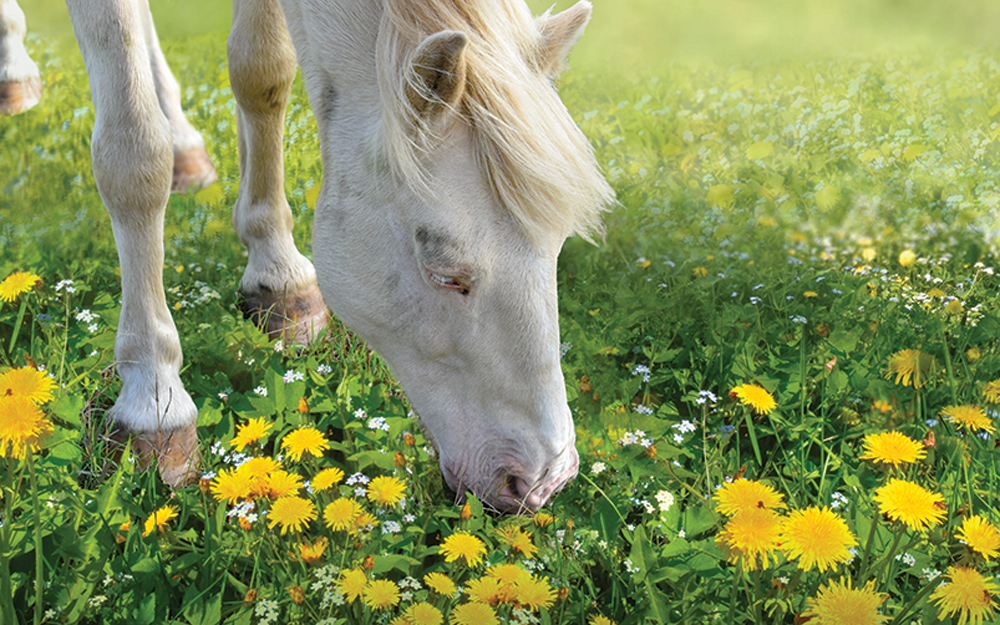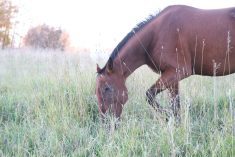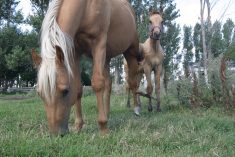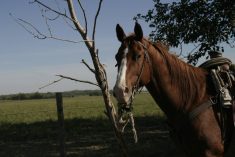Domestic horses are known for their preference for lush green pastures and sweet hay, yet their natural foraging behaviour intrigues equine professionals, scientists and horse owners: their attraction to a specific group of plants known as bitters.
Horses, with their remarkable sense of taste and intuition, display a strong and deliberate inclination toward certain plants containing bitter compounds when allowed to graze in natural settings, during trail rides or along hedgerows and fence lines.
Read Also

Roots of Resilience: The 50-year evolution of Shipwheel Cattle Feeders
Alberta’s Shipwheel Cattle Feeders is one of Canada’s pioneers in holistic regenerative agricultural practices.
Plants classified as bitters hold a rich history woven into traditional medicine, dating back thousands of years. Dandelion, chamomile and milk thistle were foraged by our forebearers as a digestive support and to alleviate various ailments.
To the discerning palate of the horse, not all plants are equal. Top choices include dandelions, thistle, yarrow, nettle, plantain, raspberry bushes, rosebushes, shrubby cinquefoil, hazelnut and willows.
The modern horse-keeping diet is largely centred around rich processed feeds and grasses and can unintentionally disrupt the delicate balance in their digestive tracts and metabolic systems. When given the opportunity, horses are naturally guided to bitters, presumably as a way to restore harmony.
Bitter herbs like plantain, for instance, have a flavour profile that stimulates taste receptors, triggering certain physiological responses and hormonal pathways in the body. When horses consume plantain, the bitter taste activates their digestive system, promoting secretion of saliva, gastric juice and bile.
This process supports appetite and enhances overall nutrient breakdown and absorption.
It can be particularly beneficial for animals with poor appetites or digestive issues. For picky eaters or horses recovering from illness, the bitter taste can act as a natural appetite stimulant by encouraging them to eat more willingly.
The equine’s preference for bitters extends beyond merely satisfying the taste buds. These plants serve as powerful tools to nourish the horse’s gut microbiome and exert influence that reaches far beyond digestion.
Specific bitter plants, such as milk thistle and dandelions, have a known positive impact on liver function. By supporting the detoxification pathways that process toxins and waste products, these plants indirectly contribute to a healthier gut environment.
A horse’s digestive microbiome is the bustling community of microorganisms residing in the horse’s gastrointestinal tract, particularly the hindgut. One of the strongest advantages bitter plants offer to the equine digestive system is their prebiotic properties.
Prebiotics are compounds that act as nourishment and support for beneficial gut bacteria.
By feeding the microbiome of the horse, bitters contribute to a balanced and flourishing gut environment that can, in turn, optimize nutrient absorption and metabolism. Dandelion is well recognized for providing this advantage.
Certain bitters, such as milk thistle, also possess antioxidant properties. The active component in milk thistle is a flavonoid complex called silymarin, known for its potent antioxidant and anti-inflammatory effects.
Silymarin helps protect the liver from damage by neutralizing harmful free radicals and supporting the body’s natural detoxification processes.
As a result, milk thistle is often used as an herbal remedy to support liver health and protect against oxidative stress in both humans and animals, including horses.
Bitter plants also offer soothing support to the digestive tract through known and unknown hormonal pathways, effectively calming the gut and reducing inflammation.
It’s essential to recognize that inflammation in the gut can have far-reaching effects on the whole body. The anti-inflammatory impact of bitters on the gastrointestinal tract addresses general inflammation by maintaining a stable, resilient and thriving microbiome.
When given the chance, the domestic horse shows a natural inclination and affinity toward bitter plants, demonstrating an innate wisdom and connection to the healing remedies of nature.
















